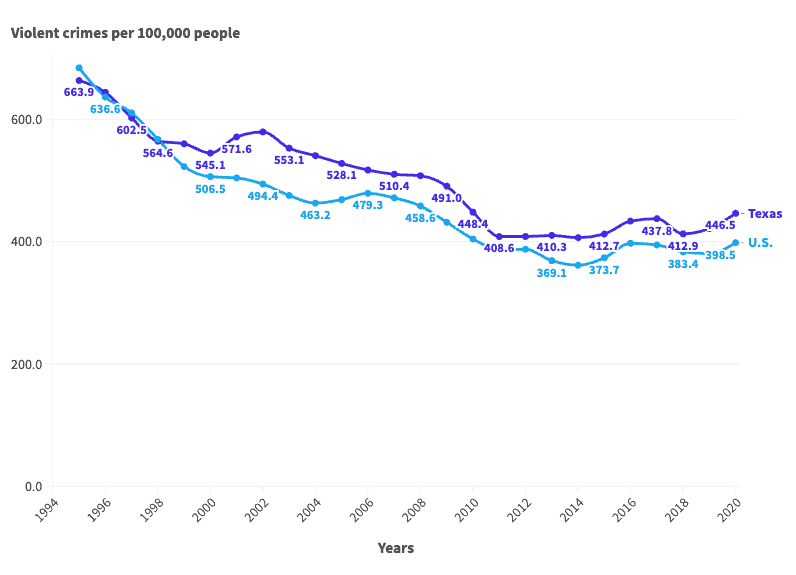Special Report
How the Crime Rate in Texas Compares to the Rest of the Country

Published:

Violent crime has been trending downward in the United States for decades. According to the FBI, the U.S. violent crime rate — a population-adjusted measure that includes incidents of robbery, homicide, and aggravated assault — fell by nearly 90% between the mid-1990s and mid-2010s. Though a historic surge in homicides helped drive the violent crime rate up in 2020, the U.S. remains far safer than it was at any point in the 1990s.
Over the 26 year period of comprehensive FBI data, beginning in 1995 and going through 2020, the number of violent crimes reported annually in the U.S. ranged from about 1.8 million, down to less than 1.2 million. Over the same period, the violent crime rate peaked at 684 incidents for every 100,000 people in 1995, and hit a multi-decade low of 362 per 100,000 in 2014.
The FBI also tracks violent crime rates at the state level, and in Texas, criminal violence tends to be more concentrated than it is nationwide. Nearly every year between 1995 and 2020, the violent crime rate in Texas exceeded the national rate, often by a wide margin.
Still, like the U.S. as a whole, Texas is much safer now than it was in the 1990s. As of 2020, Texas’ violent crime rate was 33% lower than it was in 1995.
While some factors that led to the reduction of criminal violence remain unknown, experts have identified several likely underlying causes. According to a report from the Brennan Center for Justice, a non-profit policy institute, these include an aging population, declining alcohol use, increased policing and incarceration, and several economic conditions related to inflation, unemployment, and consumer confidence.
While homicide is the most serious violent offense in the FBI’s hierarchy of violent offenses, it is also the least common. In the last 26 years, homicides have never accounted for more than 1.5% of all violent crimes reported in Texas. In contrast, aggravated assault has accounted for over half of all violent offenses reported in Texas every year.



























| Year | Violent crimes per 100,000 people in Texas | Violent crimes per 100,000 people in the U.S. | Total violent crimes in Texas | Total violent crimes in the U.S. |
|---|---|---|---|---|
| 1995 | 663.9 | 684.5 | 124,303 | 1,798,792 |
| 1996 | 644.4 | 636.6 | 123,270 | 1,688,540 |
| 1997 | 602.5 | 611.0 | 117,126 | 1,636,099 |
| 1998 | 564.6 | 567.6 | 111,566 | 1,533,887 |
| 1999 | 560.3 | 523.0 | 112,306 | 1,426,044 |
| 2000 | 545.1 | 506.5 | 113,653 | 1,425,486 |
| 2001 | 571.6 | 504.5 | 122,155 | 1,439,480 |
| 2002 | 579.7 | 494.4 | 126,018 | 1,423,677 |
| 2003 | 553.1 | 475.8 | 122,246 | 1,383,676 |
| 2004 | 540.9 | 463.2 | 121,554 | 1,360,088 |
| 2005 | 528.1 | 469.0 | 121,091 | 1,390,745 |
| 2006 | 517.3 | 479.3 | 121,602 | 1,435,123 |
| 2007 | 510.4 | 471.8 | 122,014 | 1,422,970 |
| 2008 | 508.0 | 458.6 | 123,585 | 1,394,461 |
| 2009 | 491.0 | 431.9 | 121,684 | 1,325,896 |
| 2010 | 448.4 | 404.5 | 113,231 | 1,251,248 |
| 2011 | 408.6 | 387.1 | 104,734 | 1,206,031 |
| 2012 | 408.6 | 387.8 | 106,475 | 1,217,057 |
| 2013 | 410.3 | 369.1 | 108,757 | 1,168,298 |
| 2014 | 406.7 | 361.6 | 109,711 | 1,153,022 |
| 2015 | 412.7 | 373.7 | 113,193 | 1,199,310 |
| 2016 | 433.8 | 397.5 | 121,064 | 1,285,606 |
| 2017 | 437.8 | 394.9 | 123,984 | 1,283,875 |
| 2018 | 412.9 | 383.4 | 118,197 | 1,252,399 |
| 2019 | 421.8 | 380.8 | 122,263 | 1,250,393 |
| 2020 | 446.5 | 398.5 | 131,084 | 1,313,105 |
Start by taking a quick retirement quiz from SmartAsset that will match you with up to 3 financial advisors that serve your area and beyond in 5 minutes, or less.
Each advisor has been vetted by SmartAsset and is held to a fiduciary standard to act in your best interests.
Here’s how it works:
1. Answer SmartAsset advisor match quiz
2. Review your pre-screened matches at your leisure. Check out the advisors’ profiles.
3. Speak with advisors at no cost to you. Have an introductory call on the phone or introduction in person and choose whom to work with in the future
Thank you for reading! Have some feedback for us?
Contact the 24/7 Wall St. editorial team.